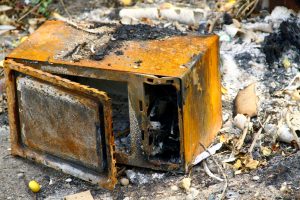 Spoliation has become a growing problem in the world of insurance subrogation. Far too often, claims representatives or subrogation professionals fail to secure defective products or other evidence important to a future subrogation claim. In far too many cases, the problem isn’t one of apathy or irresponsibility. It isn’t a matter of claims personnel not caring. In many cases, the underlying cause of squandered subrogation potential due to spoliation is a lack of subrogation education and training. Without evidence, subrogation fails to launch. The sooner in the life of a claim file that subrogation is recognized and acted on, the more likely it is that valuable evidence and products necessary to a successful subrogation recovery will be preserved. Understanding the law of spoliation is critical in the world of claims, and a recent federal district court decision from the Eastern District of Pennsylvania underscores how difficult it is to overcome a spoliation problem in a case.
Spoliation has become a growing problem in the world of insurance subrogation. Far too often, claims representatives or subrogation professionals fail to secure defective products or other evidence important to a future subrogation claim. In far too many cases, the problem isn’t one of apathy or irresponsibility. It isn’t a matter of claims personnel not caring. In many cases, the underlying cause of squandered subrogation potential due to spoliation is a lack of subrogation education and training. Without evidence, subrogation fails to launch. The sooner in the life of a claim file that subrogation is recognized and acted on, the more likely it is that valuable evidence and products necessary to a successful subrogation recovery will be preserved. Understanding the law of spoliation is critical in the world of claims, and a recent federal district court decision from the Eastern District of Pennsylvania underscores how difficult it is to overcome a spoliation problem in a case.
 In State Farm Fire & Cas. Co. v. Cohen, 2020 WL 5369626 (E.D. Pa. 2020), the insured rented property to a tenant named Lugretta Bryant. The tenant’s property was damaged in a fire and her insurance company investigated subrogation potential. A fire investigator hired by the tenant’s carrier concluded an origin near an appliance provided with the apartment and located in the kitchen. The investigator told everybody to preserve the microwave so that a joint examination could take place in the future. The tenant claimed she left the microwave at the scene when she cleaned her apartment, but months later the landlord’s staff discovered that the microwave had gone missing. Nobody knew where it was.
In State Farm Fire & Cas. Co. v. Cohen, 2020 WL 5369626 (E.D. Pa. 2020), the insured rented property to a tenant named Lugretta Bryant. The tenant’s property was damaged in a fire and her insurance company investigated subrogation potential. A fire investigator hired by the tenant’s carrier concluded an origin near an appliance provided with the apartment and located in the kitchen. The investigator told everybody to preserve the microwave so that a joint examination could take place in the future. The tenant claimed she left the microwave at the scene when she cleaned her apartment, but months later the landlord’s staff discovered that the microwave had gone missing. Nobody knew where it was.
The tenant’s carrier filed a subrogation suit against the landlord, arguing that the landlord’s failure to maintain the microwave was the cause of the fire. The landlord filed a motion for summary judgment based on no evidence and asked the court to grant an adverse inference in its favor because the microwave had disappeared. The carrier asked that the court instruct the jury to infer that the microwave showed signs of poor maintenance. It argued that the defendant had control and custody of the evidence and was, therefore, responsible for its disappearance.
Following the standard established by the 3rd Circuit Court of Appeals in Schmid v. Milwaukee Elec. Tool Corp., 13 F.3d 76 (3rd Cir. 1994), the federal court applied a two-part analysis. It first determined if any spoliation occurred, and then decided on an appropriate sanction. As noted by the court, the “spoliation analysis” is distinct from the “sanctions analysis” and courts must conduct the spoliation analysis before determining any sanctions.
In a “spoliation analysis,” spoliation is deemed to have occurred if:
- the evidence is within the alleged spoliator’s control;
- there has been actual suppression or withholding of the evidence;
- the evidence was relevant; and
- it was reasonably foreseeable that the evidence would be discoverable.
With respect to the second prong of the test, the federal court in Cohen emphasized that the 3rd Circuit requires a showing of “intentionality and bad faith.” A defendant’s mere negligence in failing to preserve evidence is not enough.
The tenant’s subrogated carrier made no argument that the landlord intentionally and/or in bad faith facilitated the disposal of the microwave and, therefore, the court ruled that the carrier could not establish that spoliation occurred. The court, therefore, didn’t even consider the “sanction analysis.” The adverse inference being requested by the tenant’s carrier was denied.
This case makes crystal clear that a spoliation sanction requires proof that the alleged spoliation was beyond accident or mere negligence. The party seeking a spoliation sanction must demonstrate it was intentional and that the alleged spoliator acted in “bad faith” before adverse inferences will be provided. In short, parties seeking an adverse inference in cases of spoliation cannot rely on negligence alone.
For a chart depicting the spoliation laws of all 50 states, see HERE. Some states allow for first-party spoliation torts to be prosecuted, while others merely allow lesser sanctions, including an adverse inference. Pennsylvania, however, remains one of the strictest states regarding spoliation. If you have any questions about subrogation or preventing spoliation in subrogation cases, please contact Gary Wickert at gwickert@mwl-law.com.






